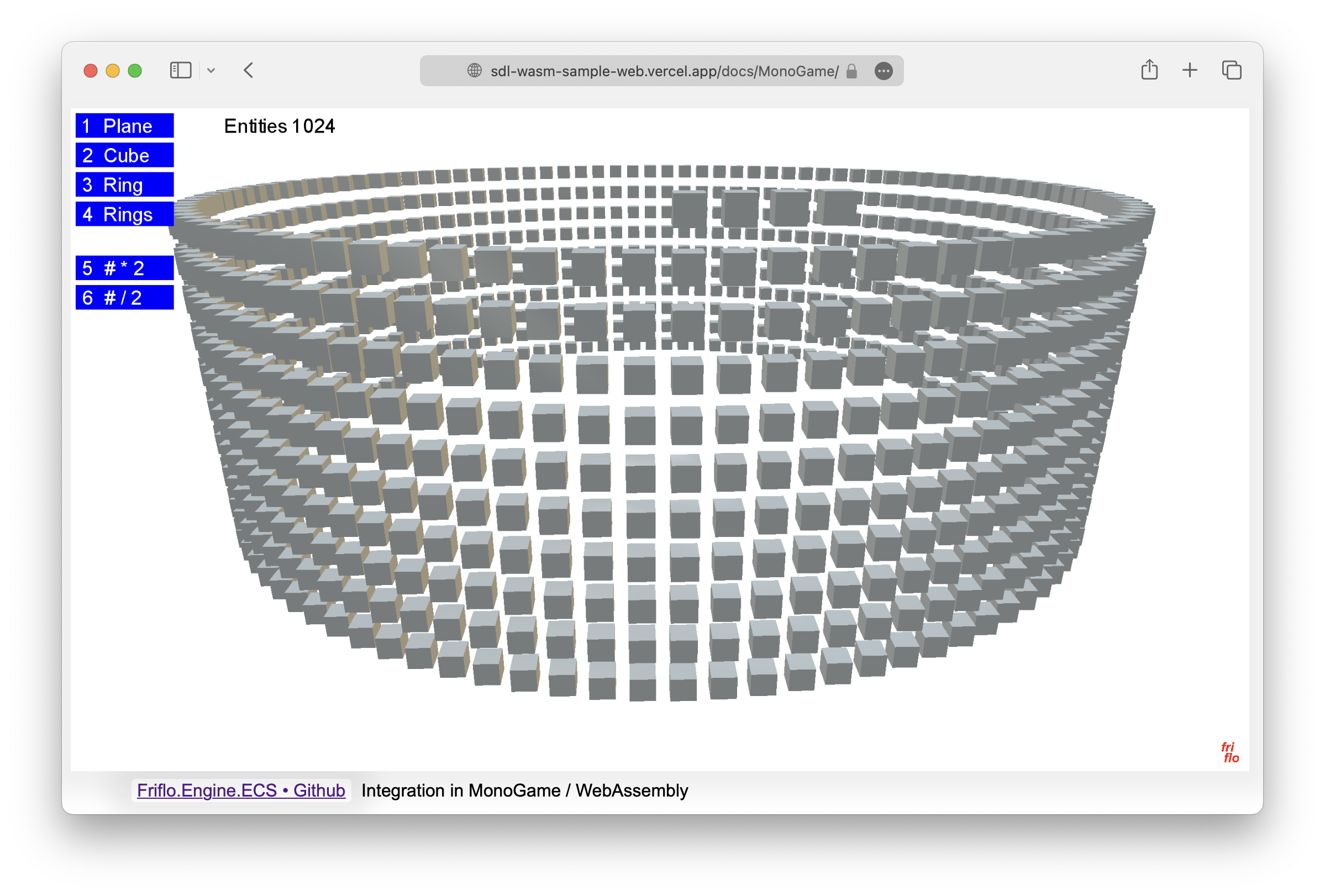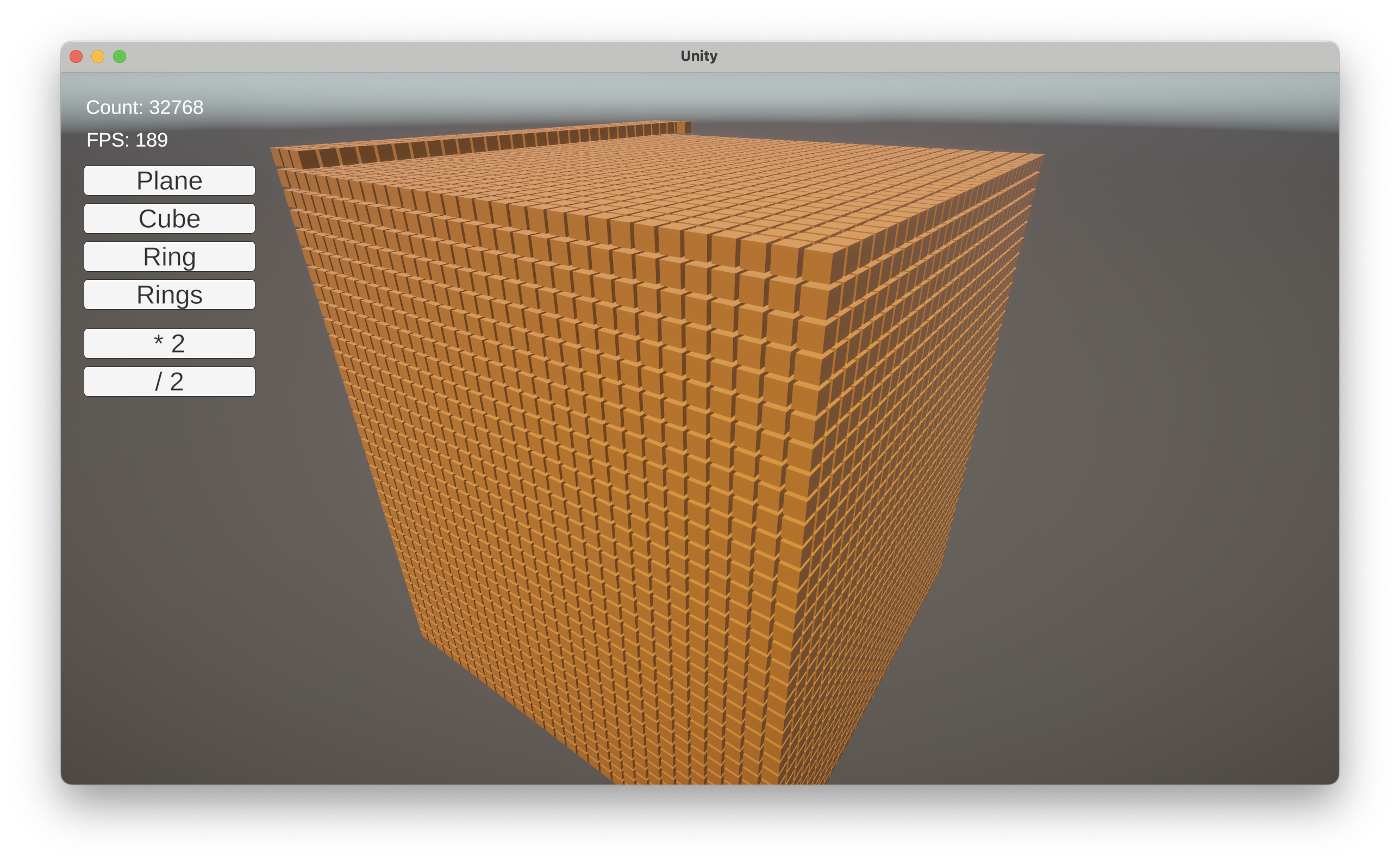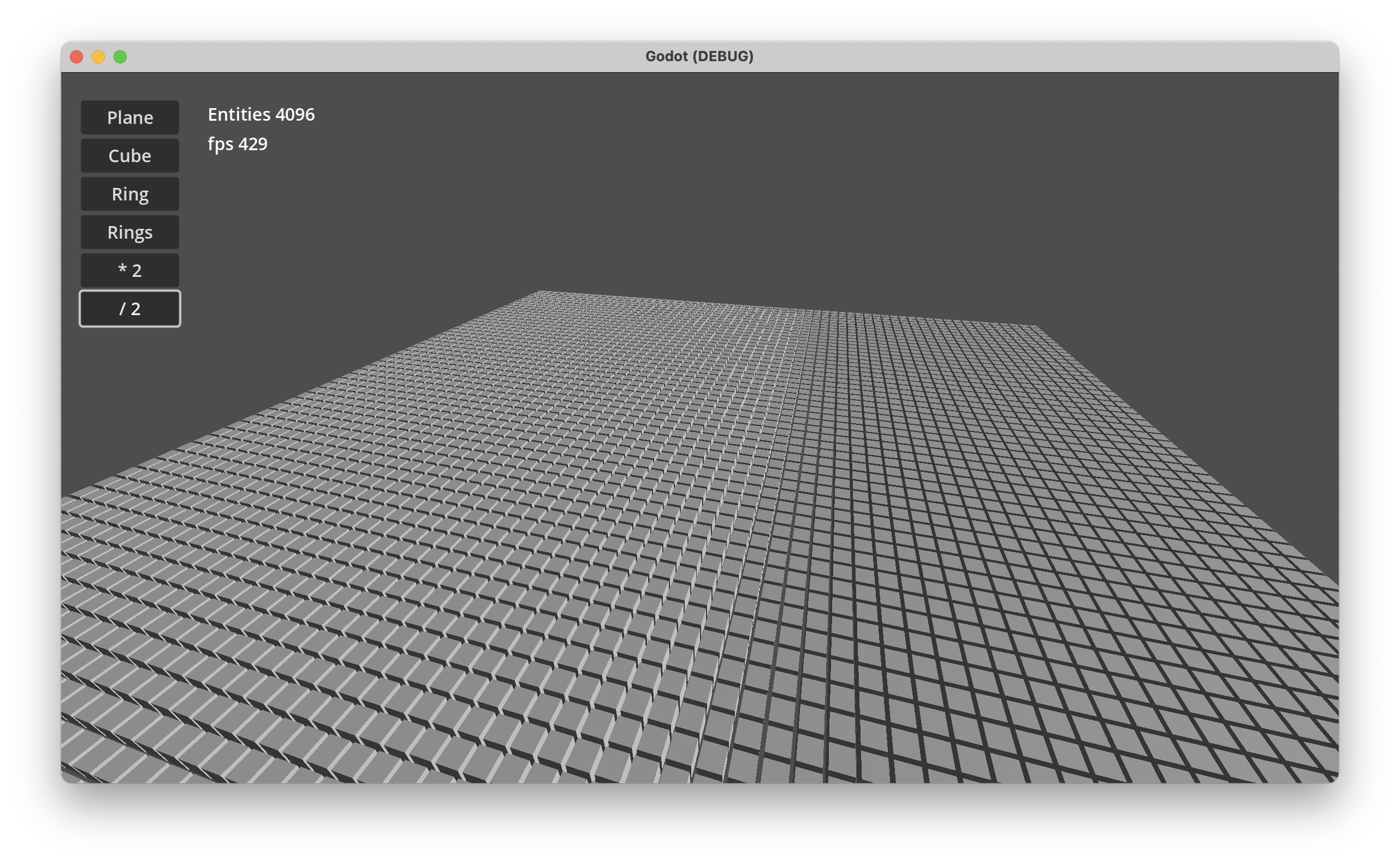Currently fastest 🔥 ECS implementation in C# / .NET - using Ecs.CSharp.Benchmark as reference.
See benchmark results - Mac Mini M2 - at the bottom of this page.
This ECS is an Archetype / AoS based Entity Component System. See: ECS ⋅ Wikipedia.
Feature highlights
- Simple API - no boilerplate.
- High-performance 🔥 and compact ECS with low memory footprint.
- Zero allocations for entire API after buffers grown large enough.
- Fully reactive - optional. Subscribe change events of all or specific entities.
- JSON Serialization - optional.
- SIMD Support - optional. Multi thread capable and remainder loop free.
- Supports .NET Standard 2.1 .NET 5 .NET 6 .NET 7 .NET 8
WASM / WebAssembly, Unity (Mono, AOT/IL2CPP, WebGL), Godot, MonoGame, ... andNative AOT
- Library uses only secure and managed code. No use of unsafe code. See Wiki ⋅ Library.
App / Game can access component chunks with native or unsafe code usingSpan<>s.
Complete feature list at Wiki ⋅ Features.
Get package on nuget or use the dotnet CLI.
dotnet add package Friflo.Engine.ECS
MonoGame Demo is available as WASM / WebAssembly app. Try Demo in your browser.
 |
 |
 |
| MonoGame Project | Unity Project | Godot Project |
Desktop Demo performance: Godot 202 FPS, Unity 100 FPS at 65536 entities.
All example Demos - Windows, macOS & Linux - available as projects for MonoGame, Unity and Godot.
See Demos · GitHub
This section contains two typical use cases when using an ECS.
More examples are in the GitHub Wiki.
Examples - General
Explain fundamental ECS types like Entity, Component, Tag, Command Buffer, ... and how to use them.
Examples - Optimization
Provide techniques how to improve ECS performance.
The hello world examples demonstrates the creation of a world, some entities with components
and their movement using a simple ForEachEntity() call.
public struct Velocity : IComponent { public Vector3 value; }
public static void HelloWorld()
{
var world = new EntityStore();
for (int n = 0; n < 10; n++) {
world.CreateEntity(new Position(n, 0, 0), new Velocity{ value = new Vector3(0, n, 0)});
}
var query = world.Query<Position, Velocity>();
query.ForEachEntity((ref Position position, ref Velocity velocity, Entity entity) => {
position.value += velocity.value;
});
}In case of moving (updating) thousands or millions of entities an optimized approach can be used.
See:
Enumerate Query Chunks,
Parallel Query Job and
Query Vectorization - SIMD.
All query optimizations are using the same query but with different enumeration techniques.
Systems are new in Friflo.Engine.ECS v2
Systems in ECS are typically queries.
So you can still use the world.Query<Position, Velocity>() shown in the "Hello World" example.
Using Systems is optional but they have some significant advantages:
-
It enables chaining multiple decoupled QuerySystem classes.
-
A system can have state - fields or properties - which can be used as parameters in
OnUpdate().
The system state can be serialized to JSON. -
Systems are added to a SystemGroup.
Each group provide a CommandBuffer. -
Systems can be enabled/disabled or removed.
The order of systems in a group can be changed. -
Systems have performance monitoring build-in to measure execution times and memory allocations.
If enabled systems detected as bottleneck can be optimized. -
Multiple worlds can be added to a single SystemRoot instance.
root.Update()will execute every system on all worlds.
public static void HelloSystem()
{
var world = new EntityStore();
for (int n = 0; n < 10; n++) {
world.CreateEntity(new Position(n, 0, 0), new Velocity(), new Scale3());
}
var root = new SystemRoot(world) {
new MoveSystem(),
// new PulseSystem(),
// new ... multiple systems can be added. The execution order still remains clear.
};
root.Update(default);
}
class MoveSystem : QuerySystem<Position, Velocity>
{
protected override void OnUpdate() {
Query.ForEachEntity((ref Position position, ref Velocity velocity, Entity entity) => {
position.value += velocity.value;
});
}
}A valuable strength of an ECS is establishing a clear and decoupled code structure.
Adding the PulseSystem below to the SystemRoot above is trivial.
class PulseSystem : QuerySystem<Scale3>
{
float frequency = 4f;
protected override void OnUpdate() {
Query.ForEachEntity((ref Scale3 scale, Entity entity) => {
scale.value = Vector3.One * (1 + 0.2f * MathF.Sin(frequency * Tick.time));
});
}
}System performance monitoring is disabled by default.
To enable monitoring call:
root.SetMonitorPerf(true);The performance statistics available at SystemPerf.
To get performance statistics on console use:
root.Update(default);
Console.WriteLine(root.GetPerfLog());The log result will look like:
stores: 1 last ms sum ms updates last mem sum mem entities
--------------------- -------- -------- -------- -------- -------- --------
Systems [2] 0.079 3.074 10 128 1392
| ScaleSystem 0.039 1.789 10 64 696 10000
| PositionSystem 0.039 1.278 10 64 696 10000last ms, sum ms last/sum system execution time in ms
updates number of executions
last mem, sum mem last/sum allocated bytes
entities number of entities matching a QuerySystem
The GitHub Wiki provide you detailed information about the ECS and illustrate them by examples.
-
Examples - General
Explain fundamental ECS types like Entity, Component, Tag, Command Buffer, ... and show you how to use them.
Contains an example for Native AOT integration. -
Examples - Optimization
Provide you techniques how to improve ECS performance. -
Extensions
Projects extending Friflo.Engine.ECS with additional features. -
Features
Integration possibilities, a complete feature list and performance characteristics 🔥. -
Library
List supported platforms, properties of the assembly dll and build statistics. -
Release Notes
List of changes of every release available on nuget.
Two benchmarks - subset of GitHub ⋅ Ecs.CSharp.Benchmark + PR #38 running on a Mac Mini M2.

Improved create entities performance by 3x to 4x and minimized entity memory footprint from 48 to 16 bytes.
Published in nuget package 2.0.0-preview.3.
Made a subset as the other benchmarks are similar only with different parameters.
- Create 100.000 entities with three components
- Update 100.000 entities with two components
| Method | Mean | Gen0 | Gen1 | Gen2 | Allocated | |
|---|---|---|---|---|---|---|
| Arch | 6,980.1 μs | - | - | - | 3948.51 KB | |
| SveltoECS | 28,165.0 μs | - | - | - | 4.97 KB | |
| DefaultEcs | 12,680.4 μs | - | - | - | 19517.01 KB | |
| Fennecs | 24,922.4 μs | - | - | - | 16713.45 KB | |
| FlecsNet | 12,114.1 μs | - | - | - | 3.81 KB | |
| FrifloEngineEcs | 🔥 | 405.3 μs | - | - | - | 3625.46 KB |
| HypEcs | 22,376.5 μs | 6000.0000 | - | - | 68748.73 KB | |
| LeopotamEcsLite | 5,199.9 μs | - | - | - | 11248.47 KB | |
| LeopotamEcs | 8,758.8 μs | 1000.0000 | - | - | 15736.73 KB | |
| MonoGameExtended | 30,789.0 μs | 1000.0000 | - | - | 30154.38 KB | |
| Morpeh_Direct | 126,841.8 μs | 9000.0000 | 5000.0000 | 2000.0000 | 83805.52 KB | |
| Morpeh_Stash | 67,127.7 μs | 4000.0000 | 2000.0000 | 1000.0000 | 44720.38 KB | |
| Myriad | 15,824.5 μs | - | - | - | 7705.36 KB | |
| RelEcs | 58,002.5 μs | 6000.0000 | 2000.0000 | 1000.0000 | 75702.71 KB | |
| TinyEcs | 20,190.4 μs | 2000.0000 | 1000.0000 | 1000.0000 | 21317.2 KB |
🔥 library of this project
Benchmark parameter: Padding = 0
Notable fact
SIMD MonoThread running on a single core beats MultiThread running on 8 cores.
So other threads can still keep running without competing for CPU resources.
| Method | Mean | Gen0 | Allocated | |
|---|---|---|---|---|
| Arch_MonoThread | 62.09 μs | - | - | |
| Arch_MonoThread_SourceGenerated | 52.43 μs | - | - | |
| Arch_MultiThread | 49.57 μs | - | - | |
| DefaultEcs_MonoThread | 126.33 μs | - | - | |
| DefaultEcs_MultiThread | 128.18 μs | - | - | |
| Fennecs_ForEach | 56.30 μs | - | - | |
| Fennecs_Job | 69.65 μs | - | - | |
| Fennecs_Raw | 52.34 μs | - | - | |
| FlecsNet_Each | 103.26 μs | - | - | |
| FlecsNet_Iter | 64.23 μs | - | - | |
| FrifloEngineEcs_MonoThread | 🔥 | 57.62 μs | - | - |
| FrifloEngineEcs_MultiThread | 🔥 | 17.17 μs | - | - |
| FrifloEngineEcs_SIMD_MonoThread | 🔥 | 11.00 μs | - | - |
| HypEcs_MonoThread | 57.57 μs | - | 112 B | |
| HypEcs_MultiThread | 61.94 μs | 0.2441 | 2079 B | |
| LeopotamEcsLite | 150.11 μs | - | - | |
| LeopotamEcs | 134.98 μs | - | - | |
| MonoGameExtended | 467.59 μs | - | 161 B | |
| Morpeh_Direct | 1,590.35 μs | - | 3 B | |
| Morpeh_Stash | 1,023.88 μs | - | 3 B | |
| Myriad_SingleThread | 46.20 μs | - | - | |
| Myriad_MultiThread | 366.27 μs | 28.8086 | 239938 B | |
| Myriad_SingleThreadChunk | 61.32 μs | - | - | |
| Myriad_MultiThreadChunk | 25.31 μs | 0.3662 | 3085 B | |
| Myriad_Enumerable | 238.59 μs | - | - | |
| Myriad_Delegate | 73.47 μs | - | - | |
| Myriad_SingleThreadChunk_SIMD | 22.33 μs | - | - | |
| RelEcs | 251.30 μs | - | 169 B | |
| SveltoECS | 162.92 μs | - | - | |
| TinyEcs_Each | 37.09 μs | - | - | |
| TinyEcs_EachJob | 23.52 μs | 0.1831 | 1552 B |
🔥 library of this project
License
This project is licensed under LGPLv3.
Friflo.Engine.ECS
Copyright © 2024 Ullrich Praetz - https://github.com/friflo







